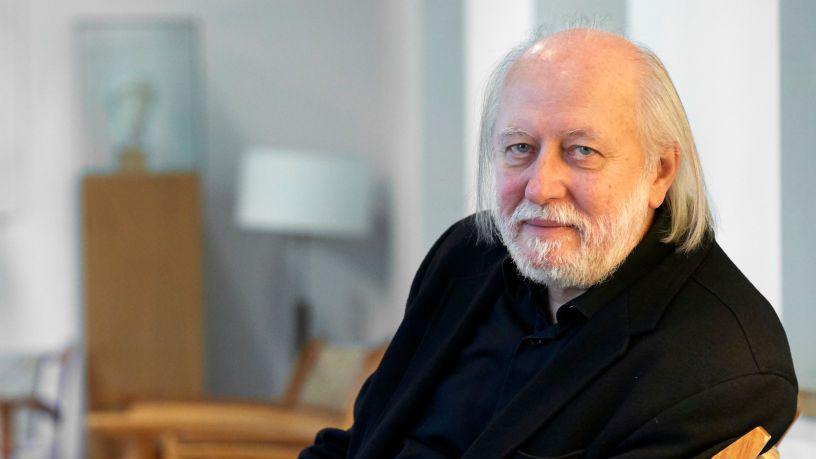Hungarian author László Krasznahorkai wins Nobel Literature Prize

- Published
László Krasznahorkai has won this year's Nobel Prize in Literature.
The Hungarian author was recognised "for his compelling and visionary oeuvre that, in the midst of apocalyptic terror, reaffirms the power of art".
"I'm very happy, I'm calm and very nervous altogether," the author told Swedish broadcaster Sveriges Radio after hearing the news.
He has written five novels and won numerous other literary prizes, including the 2015 Man Booker International Prize, and the 2013 best translated book award in Fiction for his first novel Satantango, a postmodern work about the end of the world.
Krasznahorkai was told he had won by the Swedish Academy over the phone, while he was on a visit to Frankfurt.
The prize will be handed to him at a ceremony in December in Stockholm.
He is the second Hungarian author to pick up the award following the late Imre Kertesz, who won in 2002.
Born in 1954, Krasznahorkai gained recognition in 1985 when he published Satantango.
The Swedish Academy called his debut novel "a literary sensation."
He adapted the book for the big screen in 1994. The black-and-white drama, by Hungarian film-maker Bela Tarr, is notable for its seven-hour running time.
Krasznahorkai's other books include:
The Melancholy of Resistance (1989)
War and War (1999)
Seiobo There Below (2008)
The Nobel Prize in Literature committee described Krasznahorkai as "a great epic writer in the Central European tradition, external that extends through Kafka to Thomas Bernhard, and is characterised by absurdism and grotesque excess."
Krasznahorkai once described his work as "reality examined to the point of madness".
He grew up in a middle-class Jewish family and drew inspiration from his experiences living under communism, and his travels, following his first move abroad in 1986 to what was then West Berlin.
His 2021 book Herscht 07769 has been described as a great contemporary German novel, due to its accuracy in portraying the country's social unrest just before the pandemic.
It's a portrayal of a contemporary small town in Thüringen, Germany, troubled by social anarchy, murder and arson.
British publisher The Serpent's Tail describes the plot of the novel, external, saying: "Gentle giant Florian Herscht is an orphan, adopted by a neo-Nazi who has apprenticed him as a graffiti cleaner.
"The Boss, a Bach fanatic, is enraged that someone is spraying wolf emblems across the monuments to the famed composer in their east German town."
The Guardian's Tanjil Rashid, external described it as "accordingly bleak from start to finish".
Krasznahorkai's most recent satirical novel, Zsömle Odavan, returns to Hungary.
The protagonist is 91-year-old Uncle Józsi Kada, who has a secret claim to the throne but has gone to great lengths to disappear from the world.
The Nobel Prize for Literature has been awarded 118 times since it began in 1901 but only 18 women have won.
Last year's prize was won by South Korean author Han Kang.
At the ceremony she was praised "for her intense poetic prose that confronts historical traumas and exposes the fragility of human life".
Related topics
- Published20 May 2015